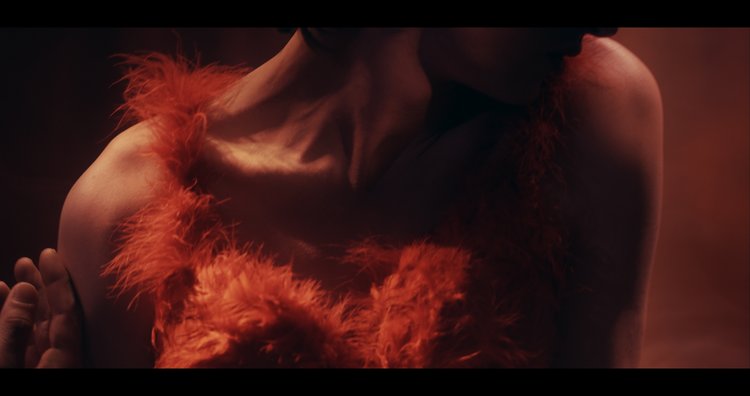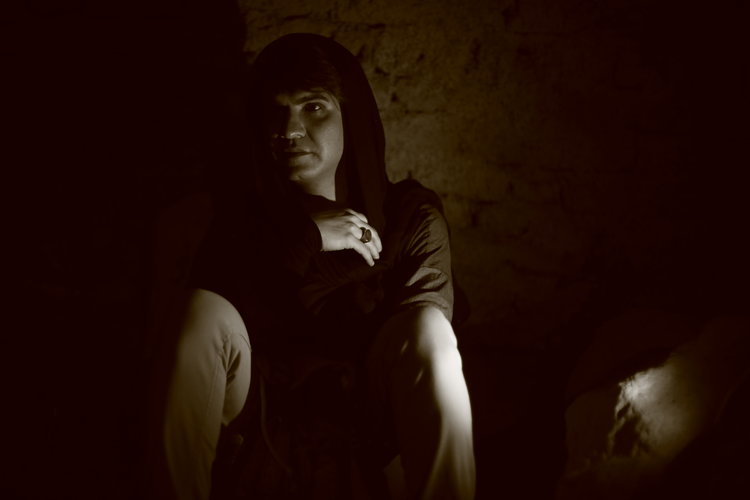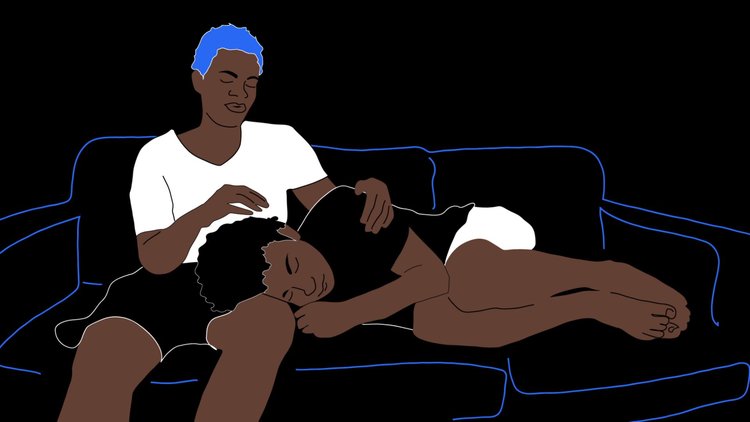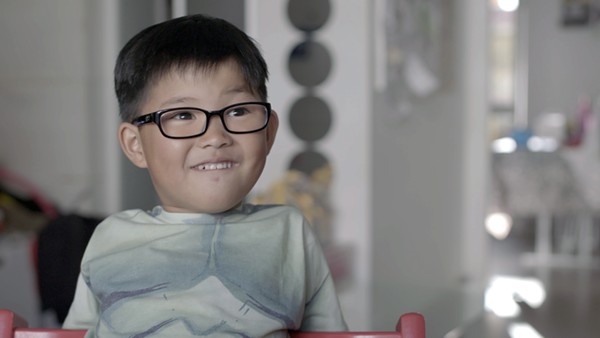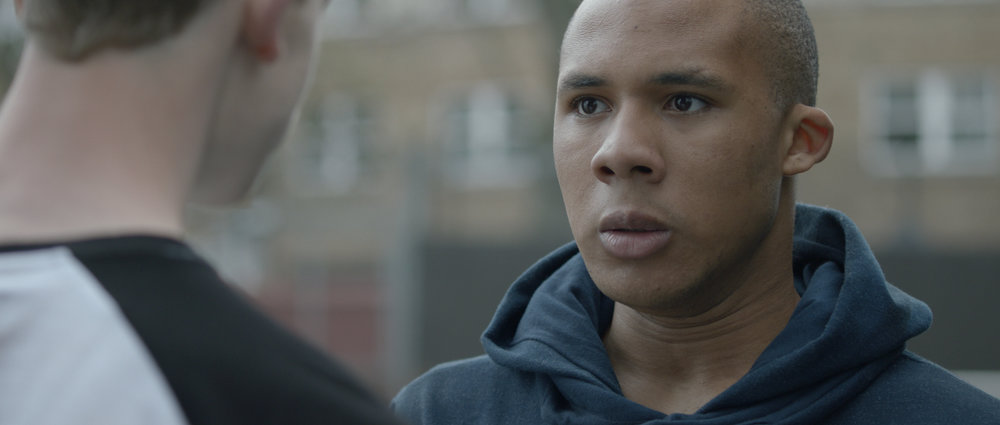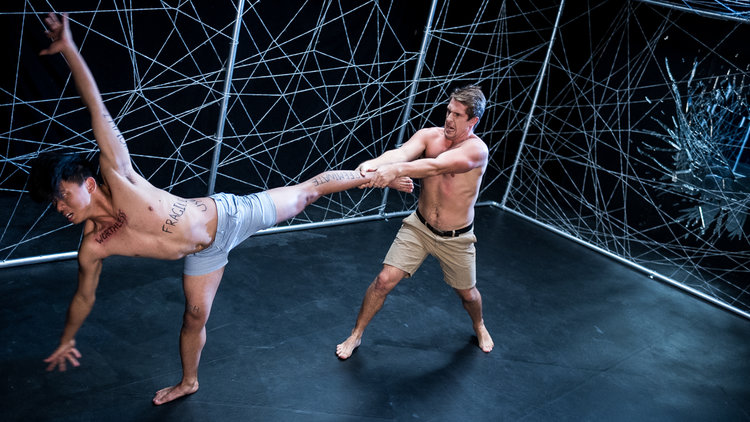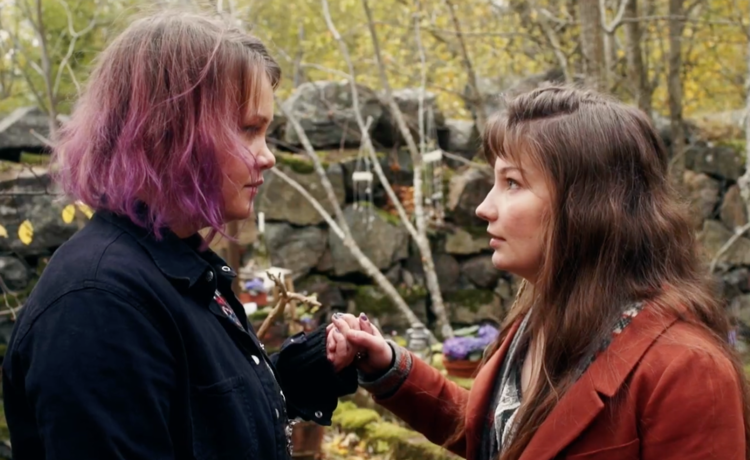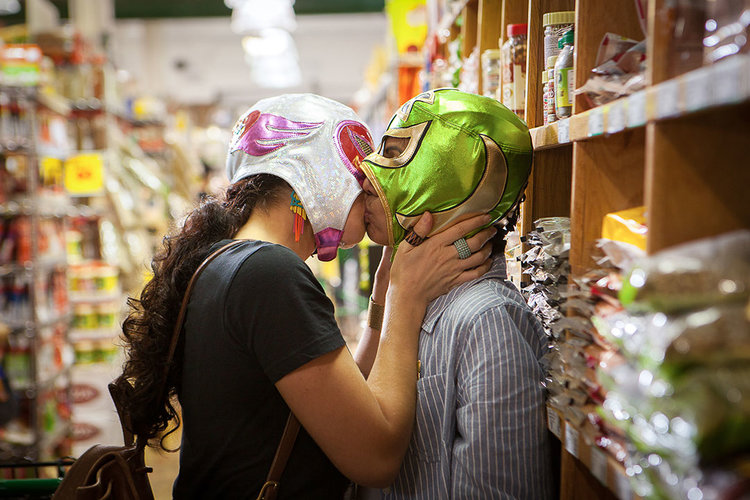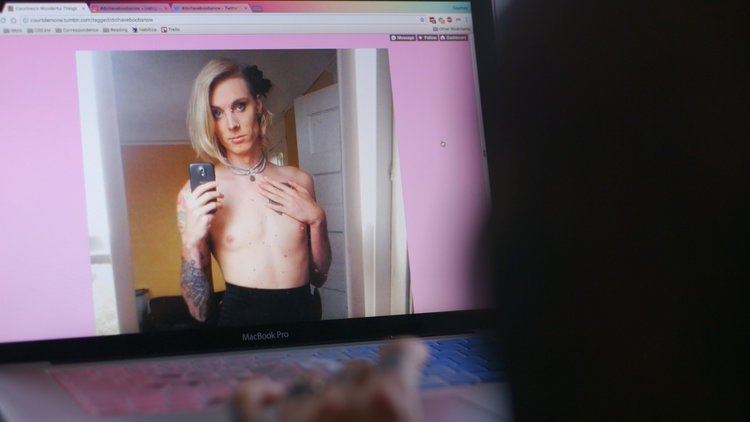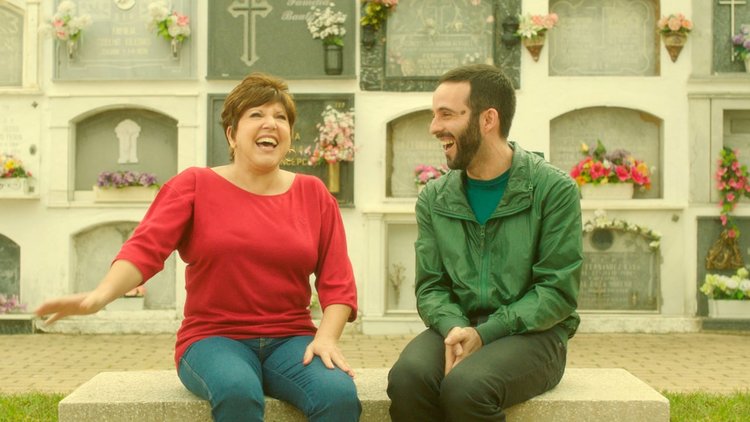Festival Coverage by Taylor Thomas and Lydia Creech
For three days in January, Bloomington PRIDE screened 25 short- and feature-length LGBTQ+ films from around the world for its 16th annual Film Festival. Taylor and Lydia were able to catch the films from two of the days, which included 6 features and over a dozen international and student shorts. What follows is structured in the form of a dialogue as they work through their experiences and opinions about the films they caught. Since it’s just talking through their reactions, a general SPOILER warning for all films discussed...
Taylor: Going into a Pride Film Fest, I had many apprehensions. While I recognize the need for festivals such as these in our current political and social climate – queer films are still largely not a part of the mainstream or in the public eye – I tend to worry about the actual curation of such events. “LGBTQ+” is not a genre, yet it continues to be treated as such, and I worry going in that I, a member of this community, will feel tokenized or subject to the same, awful tropes that we see throughout existing queer media. So it was with mild skepticism (paired with the excitement of getting to do one of my favorite things -- watching movies -- in a room full of other excited, responsive people from our local community, reminding me how important this is) that Lydia and I attended the Bloomington Pride Film Fest – a festival first for the both of us.
Lydia: It was my first time ever attending a festival with such an intense viewing schedule, and, you wouldn’t think it, but watching movies all day for two days was exhausting. I didn’t know what to expect, either, but I was hopeful to see films celebrating queer lives and experiences. However, It turned out that your concerns were valid, as due to the nature of some of the content of films dealing with LGBT issues, a lot of these viewing blocks were extremely emotionally taxing, especially the first film...
Inbexa (The Wound) by John Trengove
This offering from South Africa follows Xolani (musician Nakhane Touré), who every year travels to the mountains to help initiate Xhosa teenage boys to manhood as they undergo circumcision and fasting. However, for him this time of ritual marks a chance for his reunion with his childhood friend and lover, another man named Vija (Bongile Mantsai). Controversial not only for depicting a homosexual love triangle, but also for peeling back some of the secrecy surrounding Xhosa cultural rites, Inbexa was selected as South Africa’s Oscar bid.
T: The screening began with a content warning, for the circumcision scene that happens at almost the very beginning of the film. Though this is of course appreciated, I personally found the circumcision scene to be the least difficult to watch throughout the film. I don’t think my heart stopped pounding throughout the entirety of this film, my stomach in my throat, eyes constantly darting around waiting for the next bad thing to happen. And the worst part of this was that it was predictable, ending with the death of a main character that I saw coming from a mile away.
L: Not only was the level of violence eventually aimed at the third gay character, a young initiate named Kwanda (Niza Jay Ncoyini), surprising and stomach turning (maybe I should have expected it), but I was also uncomfortable with the distant gaze of the director, who is a white man. I’m absolutely not saying traditionalist cultures cannot be critiqued (and the ways in which the Xhosa men and rites came up against modernity are interesting -- see initiates debating the merits of BlackBerries v. iPhones while robed in traditional garb) but the outsider perspective carries unfortunate colonialist overtones that I didn’t know what to do with. I found it harrowing and a nasty shock. I didn’t find the watch enjoyable at all, especially in the context of a Pride film fest.
T: Yeah, I was really hoping to start this festival without having to see a gay character killed on screen as we often do in mainstream media. I also didn’t know what to do with it -- maybe I don’t know enough about South African politics to really understand this film. The strong themes of toxic masculinity and the pull to maintain community are obvious, but I’m not entirely sure who is being condemned here. Is it the Xhosa community, presented as homophobic but fighting to remain close in an unforgiving world? Or is it urban life, more open-minded (so we’re told by the characters), but a symbol of colonial expansion and the decay of Xhosa daily community? So when I found out that the director is a white South African man, I was afraid I had my answer.
L: Obviously a kind of rough start… After spending the break between blocks shaking and staring at each other over coffee, we were hoping the next films would be a balm...
Snapshots by Melanie Mayron
Revolving around an aging woman whose daughter and granddaughter come to visit her lonely cabin on a lake, Snapshots recounts the hidden 1960s romance between Rose (the grandmother) and Lou through memories brought about by polaroid pictures and tchotchkes found in an old box in the attic. Snapshots had its festival circuit debut at Bloomington PRIDE Film Fest and included a talkback with the writer-producer Jan Miller Corran, who discussed how her discovery of her own mother’s secret affair with another woman (and back then, it had to be a secret) influenced the script.
L: Unfortunately, in the film, Grandma’s lesbian lover smacks of trope-i-ness (specifically the Manic Pixie Dream Girl -- she’s a free-spirited artist who dances barefoot in the grass and howls because she feels like it) that the sweetness of the family drama being resolved doesn’t really overcome. Piper Laurie does give a good performance as the grandmother, though.
T: Snapshots was much easier on my anxiety-ridden body, but it still had some of the same issues. Again, we get the death of a gay character. Again, we get closeted/coming-out stories. Also, I agree, Piper Laurie’s performance was endearing, but the rest of the acting choices here are very… actorly. Think the first half of Mulholland Drive without the payoff of the last half.
L: I’m going to jump ahead to the second day for the screening block you missed with After Louie. In my head, I kind of group these together.
After Louie by Vincent Gagliostro
After Louie centers on Sam (played by Alan Cummings), an artist and former activist during the height of the AIDS crisis, and he is grumpy and cynical about all the people he’s lost and how all the young men these days don’t even appreciate what he did for them. He takes on a younger lover who is in an open relationship with another boy (who’s actually H-Pos, imagine that), and the young man is very impressionable and boring and stereotypical and somehow interested in this 50ish-yo anti-social malcontent (even if he is played by Alan Cummings, who is rocking that salt and pepper hair).
L: After Louie won the Jury Selection prize, but it wasn’t my personal favorite of the festival. Even though After Louie and Snapshots played in different blocks and operate in different modes, they both deal with intergenerational gay characters trying (or failing) to relate to one another, anchored by central performances from very accomplished actors. Unfortunately, the characters here are marred by being stock types, on top of all being highly unlikeable… Again, it was a bit disheartening and unclear who After Louie was for. A film about a grumpy old man berating a younger gay character for not being appreciative enough wasn’t encouraging at all, and I’m unsure why it won the Selection prize, which represents the best film out of all of the submissions the Jury screened, even those that didn’t make it into the fest. If this is the best LGBTQ+ content, it makes me kind of sad to think what shape the films that didn’t get in are. Fortunately, the end of the evening was saved by a final screening of an adorable, light lesbian rom-com. I already talked a bit on the podcast about my favorite of the festival:
The Feels by Jenée LaMarque
The Feels is centered around Andi and Lu (so many queer women named Lou/Lu this weekend!) and their joint bachelorette weekend. It’s all fun and games until Lu accidentally reveals that she’s never had an orgasm and has been faking it with Andi. The film contains documentary-style footage of each character telling the story of their first orgasm, interspersed throughout the weekend’s events.
T: This film really turned the night around for me. Finally, a film taking place among characters who are already out, just living their lives. It was funny, and it was real. The talking-head cutaway interviews were particularly enriching. Some are funny, some are sad, but all are relatable in some way to anyone raised as a woman. And I’ve never, on any level, related to a character more than I related throughout the film to Lu’s weird, lesbian coworker, “Regular Helen.” Lighthearted, cute, and hilarious, while still tackling issues that affect a lot of people (queer, straight, cis, trans, white, POC, neurodivergent), this film is exactly what it wants to be.
L: It absolutely takes the place as my favorite because it was just so human and sweet and NOBODY DIED. The sense of playfulness to the whole thing was nice, as opposed to some of the festival’s really heavy and sad and serious subject matter. It felt like this film was actually celebrating the gay relationships at the heart of it, which is the kind of content I was excited to see. The crowd reactions throughout were also really fun and exciting (audible discomfort during the one straight coupling, which made me laugh even harder), so I feel like everyone else was excited to see a film like this, too.
Short Films
L: The daytime blocks on Saturday were composed mostly of short films, which had about the same hit rate of content that upsetting v uplifting. Standouts for me include “The Whole World” from Spain, about a loving (if over the top) mother’s relationship with her gay son, and her decision to pathologize intolerance rather than unconformity, and “Rise Up From This Soil” from Finland, about mysteries and witches and lesbians (it was cute).
T: I loved the world-building of both of these shorts! The stark Finnish natural landscape made for captivating environment -- crisp, refreshing, and thoroughly entangled with the plot. My favorite, though, was “The Whole World.” Full of the vibrant colors of a small Spanish town, camerawork reminiscent of Wes Anderson, and superb framing of shots that really encapsulate late 20th century Spain, the film is nothing short of enchanting.
L: However, many of the shorts also dealt with stories of violence against their gay characters, ranging from a dance/performance art piece about childhood abuse (“Iridescence”) to chav-y, adoselent hate crimes (“Colours”), which put me in the same mood as the feature that opened the fest...
T: I agree. Most of these shorts had me wondering who these films were for. I didn’t feel pride as I watched most of them -- I felt an unhealthy reminder of why so many stay in the closet for so long, of how we often can’t show affection in public. It felt like some of these were made less for the people in the audience and more as PSA’s to show your less-than-accepting family, to shock them into realizing that ~news flash~ you’re a person with feelings...and a body that bleeds and breaks.
L: The student short block was a first for the festival, and slightly more uplifiting?
T: If exactly what you’d expect from student film projects.
L: Since it was curated from previous student film festivals at the IU Cinema for LGBTQ+ content, many of the shorts included sort of sweet, older documentaries about the fight for marriage equality in Indiana (They all used Macklemore’s “Same Love,” which I thought was kind of hilarious and touching), and a piece about The Backdoor, Bloomington’s only gay bar and exclusively queer space. Other student films included more experimental direct animation (actually painting onto the film stock) and collage animation and shooting on 16mm film, which I thought were impressive efforts (if, like, hard to watch -- art film is not my thing). Hopefully student films can continue to be represented at the PRIDE film fest!
T: There is a definitely a place at film festivals for student work, but I wish it would have been more integrated! Each was interesting on its own, but the grouping of all of the student films together in one lunch-time block was a little much – a disorienting rapid fire of very short films without clear breaks between them or time to process. I think I would have much preferred any of these shorts if they had placed one or two in the main blocks, which would allow each to shine on their own as well as giving exposure to the student filmmakers at the larger, more well-attended events.
L: Finally, I wanted to highlight what I thought were some pretty amazing documentaries and shorts dealing with trans issues. The feature-length Transitioning: Transgender Children by Roser Oliver and Luis Monserrat from Spain was a compassionate and pretty informative documentary about the transitioning process for children and their parents. While I think a lot of the information may be known already if you’re already interested in the topic, it could be a useful starting point for someone who doesn’t know and is open to learning.
T: And I love that they included a nonbinary perspective, too, from a group of teen activists. It really expanded the scope of the documentary to show that gender doesn’t exist as a binary.
L: The short doc “Do I Have Boobs Now?” managed to pack a lot in 7 minutes, touching on censorship, social media, society’s sexualization of breasts, and transitioning, and it won the Danielle McClelland Emerging Filmmaker Award. There was an animated short doc about trans men in Brazil (“Tailor”) and a short from Iran about a trans girl trying to find housing for the night before her gender confirmation surgery (“Cocoon”). All of these were interesting explorations of gender in the context other societies and really impressed me!
T: One thing I really liked about the curation of this festival was the dedication to showcasing international filmmakers and perspectives. In addition to those you’ve already mentioned, I’ll highlight “Momo,” an endearing South Korean short about a lesbian couple dealing with custody arrangements of a cat left behind by an ex-girlfriend, and “Calamity,” a French short about a family meeting their son’s transgender girlfriend for the first time with a confusing air of sexual tension between the girlfriend and the parents (if anyone wants to tell me what this one is trying to say, please hit me up.)
L: So, finally, we get to the closing film of the festival, Signature Move by Jennifer Reeder -- an American film about an interracial couple who fall in love, lucha-style wrestling, and the conflict between one’s conservative family values and following your heart. Unfortunately, I was pretty wiped out by this point, so I don’t have muuuch to add. It was sweet, thankfully.
T: Agreed. By the end of the night, I didn’t have much energy left to feel. Film festivals, in general, are a tiring experience -- sitting multiple days in the dark with a bright screen constantly begging to be analyzed – but this one left me shaken, emotionally exhausted, and ready to retreat to my home and be alone with my cat for a few days. I was initially quite excited about Signature Move, but by the time we got there, I was just too withdrawn to give it my full attention.
Closing Thoughts
T: I guess, in the end, my worries coming into this festival were slightly misplaced. I didn’t feel tokenized, I felt victimized. I thought maybe we were past this. This isn’t to suggest that the violence LGBTQ+ individuals face isn’t still happening every day – I recognize that some of these things are still very big problems. However, that’s kind of my point. We know that. Coming into a festival with Pride in the title, I was expecting (or at least hoping) to feel excited, empowered, at home with my community. And, apart from the few excellent films I’ve discussed here, I just didn’t.
L: Overall, in just the two days we were able to attend, the festival covered a ton of ground in terms of content, style, countries, and emotional impact. I’m glad I was able to attend with you, Taylor, because it was good to have someone to process the more difficult and upsetting films with. And to share the bleariness at the end of Signature Move.
T: I’m really glad we got to share this experience, too! Even though I had issues with this event as a Pride festival, as a film festival in general, it showed me how these experiences (especially with good company) can help you grow so much as a critic and moviegoer in such a short amount of time.


